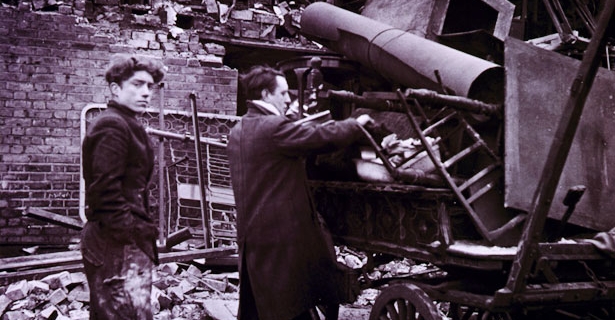When Less is More Political Engagement {unemployment uk}
http://inthesetimes.com/article/12581/when_less_is_more_political_engagement/

Among England's ruins in January 1945, two men load a wagon with their possessions. (Tony Frissell Collection/Library of Congress)
No more boom and bust,” said Gordon Brown, Chancellor of the Exchequer in 1997, New Labour’s first year in government. Fifteen years later, we are reminded daily that we are very much in a bust, and that things will get worse. We must all (or perhaps not quite all) tighten our belts in this era of austerity.
This may be less of a shock for those of us who remember Britain during the 1930s and World War II. We tell ourselves that we managed then without cars or washing machines or refrigerators. We grew quite fond of our ration books and gave a lot of thought to what could be bought with our clothing coupons. We didn’t get scurvy or get fat on a diet without oranges and bananas. Indeed, it is generally thought that the British people benefited from a more balanced and nutritious diet during the war than they’d had before it.
There was something leveling about those war years, despite films and novels that revel in the antics of the servanted classes, freezing in their unheated castles. A return to some of those lacks and scarcities would be hard for my generation, but harder still for the next one, let alone the one after that. By the middle of the 1950s we were pretty certain, after all, that life was getting better and that it would go on doing so. And it did. Our parents expected their children to have an easier time of it than they had had. Now most parents worry that their children will have far more to contend with than they did.
So far, it is undoubtedly the young who come off worst – and that really is a change. Youth unemployment is rising to new heights. Of the more than 1 million unemployed young NEETs (which stands for ‘not in education, employment or training’) between the ages of 16 and 24 in the U.K., almost 900,000 have been looking for work for a year or more. And since the announcement of a tripling of university fees, there has been a 15 percent reduction in the number of young people applying to higher education institutions for next year.
